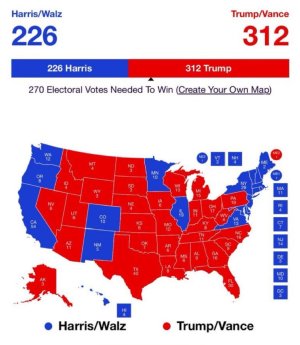- Joined
- Sep 11, 2023
- Runs
- 23,514
The 2024 election will be on Tuesday, 5 November 2024. The winner will serve a term of four years in the White House, starting in January 2025.
The president has the power to pass some laws on their own but mostly they must work with Congress to pass legislation.
On the world stage, the US leader has considerable freedom to represent the country abroad and to conduct foreign policy.
The two main parties nominate a presidential candidate by holding a series of votes called state primaries and caucuses, where people choose who they want to lead the party in a general election.
In the Republican Party, former president Donald Trump won his party's support with a massive lead over his rivals. He became the official Republican nominee at a party convention in Milwaukee, Wisconsin.
For the Democrats, Vice-President Kamala Harris became she official nominee in August at her party's convention in Chicago. She joined the race after President Joe Biden dropped out.
There are also some independent candidates running for president. One of the most prominent such candidates, Robert F Kennedy Jr, nephew to former president John F Kennedy, suspended his campaign in late August and has endorsed Trump.
Who will win? and how will the outcome of the election impact the country's future?
The president has the power to pass some laws on their own but mostly they must work with Congress to pass legislation.
On the world stage, the US leader has considerable freedom to represent the country abroad and to conduct foreign policy.
The two main parties nominate a presidential candidate by holding a series of votes called state primaries and caucuses, where people choose who they want to lead the party in a general election.
In the Republican Party, former president Donald Trump won his party's support with a massive lead over his rivals. He became the official Republican nominee at a party convention in Milwaukee, Wisconsin.
For the Democrats, Vice-President Kamala Harris became she official nominee in August at her party's convention in Chicago. She joined the race after President Joe Biden dropped out.
There are also some independent candidates running for president. One of the most prominent such candidates, Robert F Kennedy Jr, nephew to former president John F Kennedy, suspended his campaign in late August and has endorsed Trump.
Who will win? and how will the outcome of the election impact the country's future?















